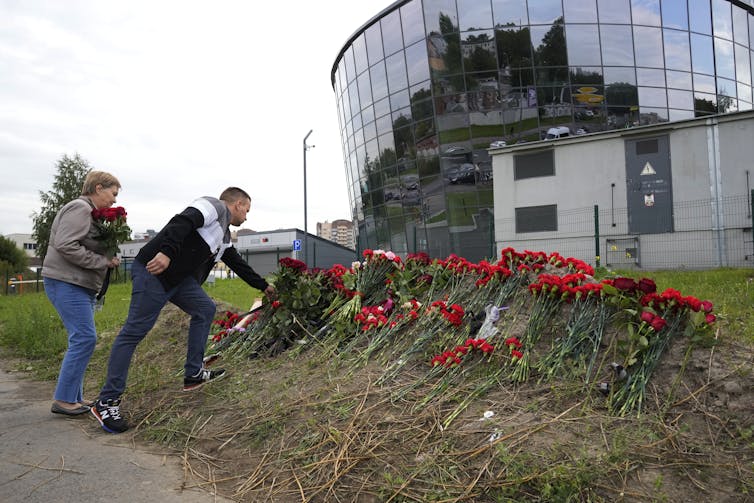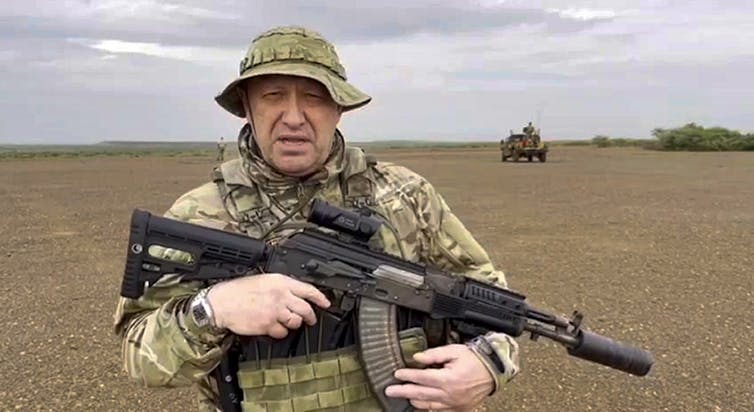On Aug. 23, Russian media reported that Yevgeny Prigozhin, the leader of the Wagner Group, was listed among the passengers of a plane that crashed, leaving no survivors. Speculation has already begun about Putin’s potential involvement in the crash. This speculation is likely to continue unabated well into the future.
Some have even argued that due to many individuals changing their names to Yevgeny Prigozhin in an attempt to thwart surveillance of the Wagner leader, it might not have been him on the flight.
Regardless of whether Putin was responsible or even if Prigozhin is still alive, the latter’s position has been undermined in Russia; Putin will benefit from this development.
(AP Photo/Alexander Zemlianichenko)
Domestic advantages
Prigozhin’s death will stabilize Putin’s domestic position. Putin has been at his weakest point, politically speaking, since the Wagner Group’s insurrection in June.
Not only did domestic elites not immediately support Putin, but the insurrection demonstrated to the Russian people that Putin’s position was not unassailable. Prigozhin’s revolt challenged the Russian political establishment in a way not done since Putin assumed power over two decades ago.
Many Russians will see Prigozhin’s death as emanating from the Kremlin. Although some people laid flowers outside of Wagner headquarters in honour of Prigozhin, this gesture does not appear to represent the majority. Instead, Prigozhin’s alleged demise will reinforce Putin’s domestic position, whether through his genuine popularity or fear of opposing him.

(AP Photo/Dmitri Lovetsky)
Russia and sanctions
The economic sanctions against Russia have been simultaneously controversial and effective. The controversy stems from the fact that the sanctions at their outset had minimal effect on the Russian economy. The Russian economy did not contract to the extent hoped for by those implementing the sanctions.
This development should not have been shocking, as Russia knew sanctions were likely after Western countries made a similar move after its annexation of Crimea. The Russian state, therefore, made moves to fortify its economy against the effects of economic sanctions.
Crucial to Russia’s ongoing efforts to avoid the worst effects of the sanctions has been finding non-Western countries with which to conduct trade. Outlets for Russian resources, such as China and India, have kept the Russian economy functioning, if not in an ideal manner. These markets have helped the Russian economy weather the worst impacts of the sanctions.
The collapsing ruble however, suggests that while sanctions were ineffective in the short term, the long-term costs are being felt.
For Russia to surmount this problem, additional markets and means of overcoming the sanctions are needed.
Wagner operations
The Wagner Group’s involvement in Ukraine represented an aberration in its standard operations. In Ukraine, the Wagner Group operated as a direct appendage of the Russian state. This was in contrast to how the group often acted in relationship to the state — it was much more common for Wagner to pursue Russian interests in campaigns where the Russian government wished to downplay its active involvement.
Syria was a textbook example of how Russia used the Wagner Group to pursue its interests while minimizing its direct involvement. In Syria, Wagner Group soldiers took an active role in not only defending the regime of Bashar al-Assad, but also conducting offensive operations that allowed the Syrian president to retake control of much of the country.
In exchange, the Wagner Group received 25 per cent of the gas, oil and phosphate production in the areas it recaptured for the Syrian government.
The Wagner Group’s actions in Africa are even more explicit from an economic standpoint. While the Wagner Group’s operations in Libya were nominally in support of Khalifa Haftar and the Libyan National Army, it simultaneously took control of key oil fields and natural gas facilities.
This development has occurred against the backdrop of the European Union looking to Libya and other countries to reduce their reliance on Russian oil and natural gas.

(Razgruzka_Vagnera Telegram channel via AP)
Libya is not alone in this regard. The Wagner Group has been actively involved in supporting numerous governments in Africa. In some countries, such as Sudan, this involved the Wagner Group establishing companies in order to directly exploit the natural resources of the country.
In other African countries, a Wagner Group presence allows for smuggling and money laundering operations. For many governments, such as the recently established junta in Niger, this is a cost they are willing to pay.
Wagner group mercenaries in Africa: why there hasn’t been any effective opposition to drive them out
Wagner’s loyalty
For Russia, all these activities by the Wagner Group provide a way of overcoming the sanctions regime. The problem Putin faced was that while Wagner Group provided him and the Russian state with vast political and economic resources, Prigozhin’s June revolt made him unreliable.
As the effects of the sanctions become more pronounced, the Russian state is exploring all avenues available to overcome these economic challenges. Whether Prigozhin truly is dead is irrelevant; Putin, in the underlying confusion, will be able to replace him with individuals loyal to him to take charge of Wagner’s vast economic empire.




